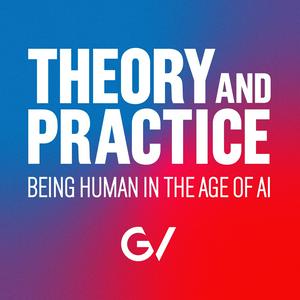S4E8: Dave Munichiello on Investing in AI’s Future
Throughout the fourth season of Theory and Practice, we explored emerging human-like artificial intelligence and robots. We asked if we could learn as much about ourselves as we do about the machines we use. The series has covered safety guardrails for AI, empathic AI communication, communication between minds and machines, robotic surgery, computers that smell, and using AI to understand human vision. The most recent episode with Google DeepMind's Dr. Clément Farabet illuminates how computers might demonstrate understanding and reasoning on par with humans. In the final episode, we reflect on investing in artificial intelligence's future with the leader of GV’s Digital Investing Team, Dave Munichiello, who has a long-standing history with AI and robotics. Dave was an early technologist at Kiva Systems, purchased by Amazon and ultimately becoming Amazon Robotics. Over the past decade-plus at GV, Dave has been leading investments across two major categories: Platforms Empowering Developers (GitLab, Segment, Slack, RedPanda, etc) and Platforms Powering AI Systems (Determined, Modular, SambaNova, Snorkel AI, etc), along with others. Dave’s first AI investment, Lattice (bought by Apple’s Siri team) was seven years before the hype of generative AI. We asked, from a seasoned AI investor's perspective, where does AI hold the most promise? To answer this, Dave returns to the themes we've investigated over the last eight weeks — including AI trust and safety, which Google Health's Greg Corrado raised in the first episode. Together, we explore how AI will change how we work, the nature of jobs, and how an investing team with a culture focused on having more questions than answers is well positioned for AI’s future.Dave rounds out the discussion with a picture of how artificial intelligence, with real-life use cases, will move research lab theory to real-world practice. He also walks us through his hopes for AI, including a world where humans and computers exist as co-pilots.Ultimately, Dave shares an optimistic and rational view of AI's future. “AI has the potential to democratize the very creation of technology," he reflects. "With AI-assistance, folks across the country will no longer need to rely on software programmers to solve everyday digital problems – they’ll be able to create these tools themselves. That is incredibly exciting, and I'm honored to be a part of that journey."
